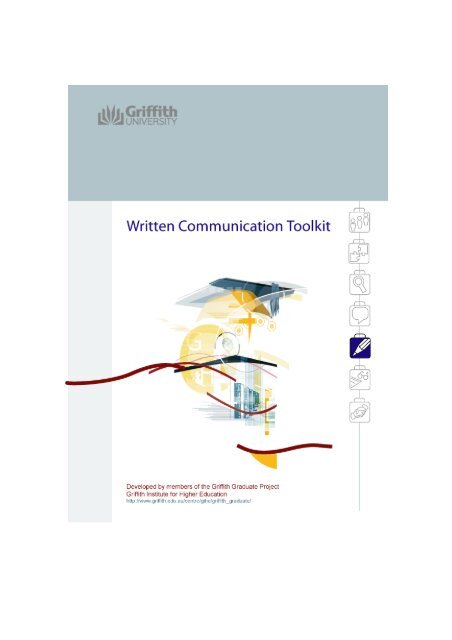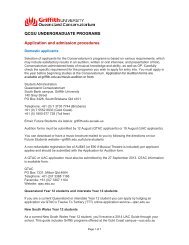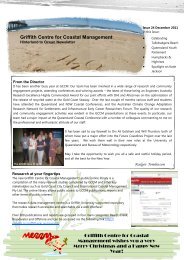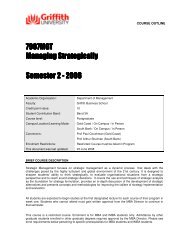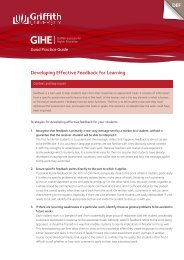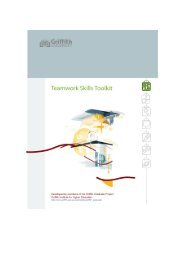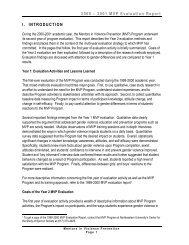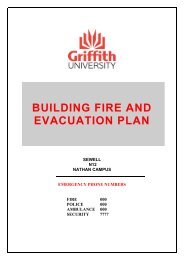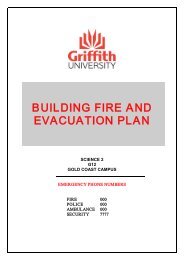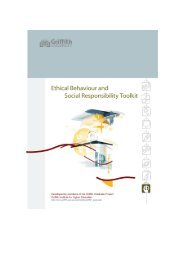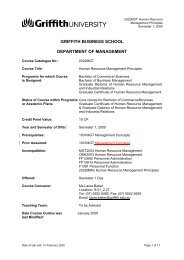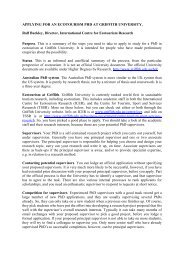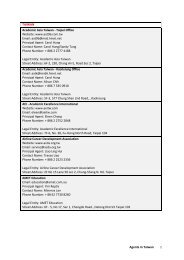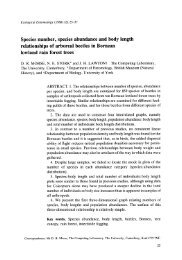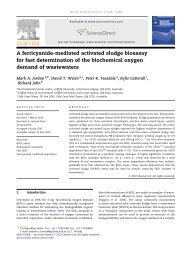Purpose of this Toolkit - Griffith University
Purpose of this Toolkit - Griffith University
Purpose of this Toolkit - Griffith University
You also want an ePaper? Increase the reach of your titles
YUMPU automatically turns print PDFs into web optimized ePapers that Google loves.
<strong>Purpose</strong> <strong>of</strong> <strong>this</strong> <strong>Toolkit</strong><br />
The <strong>Toolkit</strong>s developed by members <strong>of</strong> the <strong>Griffith</strong> Graduate Project are intended primarily for<br />
academic staff. They <strong>of</strong>fer an overview <strong>of</strong> some <strong>of</strong> the main issues related to developing students’<br />
graduate skills during their degree studies.<br />
They draw heavily on existing literature and current practice in universities around the world and<br />
include numerous references and links to useful web resources.<br />
They are not comprehensive ‘guides’ or ‘how to’ booklets. Rather, they incorporate the<br />
perspectives <strong>of</strong> academic staff, students, graduates and employers on the graduate skills adopted by<br />
<strong>Griffith</strong> <strong>University</strong> in its Strategic Plan, 2003-2007 in the <strong>Griffith</strong> Graduate Statement:<br />
http://www.griffith.edu.au/ua/aa/plans/docs/strategicplan2003-2007.pdf<br />
This toolkit, Written Communication Skills, focuses on how you can help students to write not only<br />
academic papers, but material for a range <strong>of</strong> different audiences and contexts.<br />
This toolkit, together with others in the series including:<br />
• Analysis and Critical Evaluation;<br />
• Information Literacy;<br />
• Oral Communication;<br />
• Pr<strong>of</strong>essional Skills;<br />
• Problem Solving; and<br />
• Teamwork;<br />
can also be accessed on the Web at: http://www.griffith.edu.au/centre/gihe/griffith_graduate<br />
Copyright: <strong>Griffith</strong> Institute for Higher Education, <strong>Griffith</strong> <strong>University</strong>, Nathan, Brisbane, Australia, 2004.
Table <strong>of</strong> contents<br />
WRITTEN COMMUNICATION SKILLS<br />
Why your students need effective written communication skills ............................ 1<br />
Definition............................................................................................................................................. 1<br />
The need for written communication skills..................................................................................... 1<br />
The six ‘C’s <strong>of</strong> effective writing ........................................................................................................ 1<br />
<strong>Griffith</strong> Online Writing Skills Course .............................................................................................. 2<br />
What employers, graduates and students say about written communication<br />
skills................................................................................................................................ 3<br />
Employers’ comments........................................................................................................................ 3<br />
Graduates’ and students’ comments ................................................................................................ 4<br />
Research findings................................................................................................................................ 4<br />
Teaching tips—How to develop your students’ written communication<br />
skills................................................................................................................................ 5<br />
How to develop students’ writing skills........................................................................................... 5<br />
Structuring the writing task ............................................................................................................... 6<br />
Structuring the writing process ......................................................................................................... 7<br />
Writing skills........................................................................................................................................ 8<br />
Inclusive language............................................................................................................................. 10<br />
Assessing written communication ............................................................................ 11<br />
Provide clear criteria......................................................................................................................... 11<br />
Criteria sheets .................................................................................................................................... 12<br />
Peer review......................................................................................................................................... 13<br />
The terminology................................................................................................................................ 15<br />
When assessing student writing ...................................................................................................... 16<br />
Principles <strong>of</strong> effective written communication skills............................................... 18<br />
Writing Skills...................................................................................................................................... 18<br />
Where to go for help.................................................................................................... 19<br />
Contact............................................................................................................................................... 19<br />
Additional resources................................................................................................... 21<br />
Print resources................................................................................................................................... 21<br />
Web resources ................................................................................................................................... 22<br />
Student handouts ........................................................................................................ 23<br />
What employers, graduates and students say about written communication<br />
skills.............................................................................................................................. 25<br />
Checklists for reviewing and monitoring your writing ............................................ 27<br />
Understanding the terminology used in assignments ............................................ 29<br />
Table <strong>of</strong> contents<br />
iii
WRITTEN COMMUNICATION SKILLS<br />
Referencing.................................................................................................................. 31<br />
A sample criteria sheet for assessing students’ written work ............................... 33<br />
Table <strong>of</strong> contents<br />
iv
WRITTEN COMMUNICATION SKILLS<br />
Why your students need effective written<br />
communication skills<br />
Definition<br />
Written communication is the ability to use the conventions <strong>of</strong> disciplinary discourse to<br />
communicate effectively in writing with a range <strong>of</strong> audiences, in a variety <strong>of</strong> modes (e.g.,<br />
persuasion, argument, exposition), as context requires, using a number <strong>of</strong> different means<br />
(e.g., graphical, statistical, audio-visual and technological).<br />
The need for written communication skills<br />
Students need to write effectively to communicate with their peers, lecturers, pr<strong>of</strong>essional<br />
colleagues and employers. They are not always experienced writers when they enter<br />
university and they don’t always receive formal teaching in written communication while<br />
doing their undergraduate degrees.<br />
This <strong>Toolkit</strong> is intended to provide some useful suggestions, strategies and checklists to<br />
help your students improve their writing skills.<br />
Good communication skills are at the top <strong>of</strong> the list <strong>of</strong> what potential employers look for<br />
in graduates. The vast majority <strong>of</strong> business transactions involve written communication <strong>of</strong><br />
some kind. Employers <strong>of</strong> graduates <strong>of</strong>ten express concern that students graduate with<br />
inadequate basic written communication skills. It is generally expected that university<br />
graduates have good literacy skills that can transfer into various work contexts, but<br />
research shows that <strong>this</strong> is not always the case.<br />
The six ‘C’s <strong>of</strong> effective writing<br />
“Effective business correspondence yields results because it achieves two basic objectives.<br />
First, it conveys a clear and unambiguous message to the reader and second, it produces<br />
goodwill in that reader. To achieve these two objectives, the writer must write:<br />
• clearly:<br />
• coherently;<br />
• concisely;<br />
• correctly; with<br />
• courtesy; and<br />
• confidence.<br />
These characteristics are the result <strong>of</strong> careful planning, writing in plain English, and critical<br />
editing.”<br />
Dwyer, J. (1993). The Business Communication Handbook, (3 rd ed.). New York: Prentice Hall, p.186.<br />
Why students need effective communication skills<br />
1
WRITTEN COMMUNICATION SKILLS<br />
<strong>Griffith</strong> Online Writing Skills Course<br />
This online course was developed by Dr Marilyn Ford to improve students’ writing skills.<br />
The course is broken into three self-paced components, which cover basic grammar and<br />
writing skills.<br />
Some disciplines use <strong>this</strong> course as a zero credit point requirement, either prior to<br />
graduation, or as a pre-requisite for other subjects.<br />
The resource consists <strong>of</strong>:<br />
• lessons;<br />
• examples <strong>of</strong> errors from student writing with suggested revisions;<br />
• pdf files that contain the information from the lessons; and<br />
• quizzes.<br />
Visit:<br />
http://www.cit.griffith.edu.au/~mf/wrsk/wrsk.html<br />
Why students need effective communication skills<br />
2
WRITTEN COMMUNICATION SKILLS<br />
What employers, graduates and students<br />
say about written communication skills<br />
Employers’ comments<br />
“Our biggest issue is writing skills. Graduates need to be able to write a report. All <strong>of</strong> our<br />
outputs are written. [They] also need good oral communication skills and fundamental<br />
confidence in their ability to be able to support what is being written. However, an academic<br />
writing style is completely different from [what] we need in practice. It is the largest failing,<br />
without question, from our point <strong>of</strong> view. What the university can do to improve that is to give<br />
the opportunity for the practical application <strong>of</strong> ‘real world’ writing skills during course work.<br />
Not necessarily in a work placement environment, but actually as part <strong>of</strong> the course work.<br />
There is a big difference between the way you write a report compared with a discussion paper<br />
on criminological theory.”<br />
(Employer <strong>of</strong> <strong>Griffith</strong> Criminology and Criminal Justice Graduates, 2001)<br />
“At the risk <strong>of</strong> making a generalisation, many science graduates are not as strong in the written<br />
area as they could be. With competition for jobs so strong in the science industry, graduates<br />
cannot afford to lose ground in any area and poor spelling and grammar [are areas] where it is<br />
easy to lose ground. If you send in a poorly written/spelt resumé (to us or any potential<br />
employer), you are going to be behind the eight-ball from the start.”<br />
(Employer <strong>of</strong> <strong>Griffith</strong> Science Graduates, 2001)<br />
“Students need to realise that there are different forms <strong>of</strong> communication suited to different<br />
settings. I had a student who had done a Law degree and who came to work with me and was<br />
giving me the sorts <strong>of</strong> notes you would put down in a brief, but not a piece that would<br />
communicate with the audience. Different contexts require different types <strong>of</strong> written<br />
communication.”<br />
(Employer <strong>of</strong> <strong>Griffith</strong> Law Graduates, 2003)<br />
“As an employer, I expect to see graduates who can write, spell and put a report together that<br />
is literate, meaningful and properly researched. That is a fundamental skill but one that, we are<br />
disappointed to say, we don’t always see.”<br />
(Employer <strong>of</strong> <strong>Griffith</strong> Engineering Graduates, 2003)<br />
“Written communication skills are extremely important. People are becoming too familiar<br />
these days with email and text message communication. Graduates need to appreciate that<br />
we’re still looking for well-developed, formal, written communication skill.”<br />
(Employer <strong>of</strong> <strong>Griffith</strong> Accounting Graduates, 2004)<br />
Employers, graduates and students<br />
3
WRITTEN COMMUNICATION SKILLS<br />
Graduates’ and students’ comments<br />
“When you are writing at uni you tend to write in a format that lecturers expect. But when you<br />
get out in the workforce you are actually writing for a different kind <strong>of</strong> population and you<br />
can’t approach it [as if] you are writing a prac or an assignment.”<br />
(<strong>Griffith</strong> Graduate, 2002)<br />
“My written communication skills are constantly improving at uni because I receive feedback<br />
on my written assignments, which helps me to make improvements on my writing style. I find<br />
that my writing skills are very useful in my part-time work because I have to write lots <strong>of</strong><br />
memos to my manager to express all sorts <strong>of</strong> details about the shift. I am able to write these in<br />
a concise and informative manner, which is appreciated by my manager.”<br />
(<strong>Griffith</strong> student)<br />
“In the courses I’ve done, we’ve been taught to always ask ourselves: ‘From what point <strong>of</strong> view<br />
am I writing <strong>this</strong>? Who is going to read <strong>this</strong>?’ ”<br />
(<strong>Griffith</strong> student)<br />
Research findings<br />
“Literacy skills and written business communication skills were rated as being very important<br />
by the employers participating in an AC Nielsen research project conducted in Australia in<br />
1999. It was found that job applicants who had poor skills in <strong>this</strong> area did not fare well when<br />
seeking positions.”<br />
AC Nielsen Research Services. (1999). Employer Satisfaction with Graduate Skills. Department <strong>of</strong><br />
Education, Training and Youth Affairs. Canberra: AGPS.<br />
http://www.dest.gov.au/archive/highered/eippubs/eip99-7/eip99_7pdf.pdf<br />
Employers, graduates and students<br />
“Effectively, we are looking for people who can write in almost a bullet-point form. We are no<br />
longer really looking for people who can write wonderfully flowing twenty-five page<br />
documents, which take two hours to read.”<br />
Employer interviewed in: Harvey, L., Moon, S., and Geall, V. (1997). Graduates’ Work: Organisational<br />
Change and Student Attributes. Retrieved from the World Wide Web on 2 March, 2002:<br />
http://www.uce.ac.uk/crq/publications/gw/gwcon.html<br />
“Employers want graduates who can write for a variety <strong>of</strong> audiences. Graduates may be<br />
experienced in producing academic texts such as essays, laboratory reports and dissertations,<br />
but they are not always pr<strong>of</strong>icient in other forms <strong>of</strong> written communication, especially business<br />
communication.”<br />
Employer interviewed in: Harvey, L., Moon, S., and Geall, V. (1997). Graduates’ Work: Organisational<br />
Change and Student Attributes. Retrieved from the World Wide Web on 2 March, 2002:<br />
http://www.uce.ac.uk/crq/publications/gw/gwcon.html<br />
4
WRITTEN COMMUNICATION SKILLS<br />
Teaching tips—How to develop your<br />
students’ written communication skills<br />
How to develop students’ writing skills<br />
Make writing enjoyable:<br />
• involve students in small group writing tasks in which everyone ‘has a voice,’ and ask<br />
them to analyse the differences in writing styles;<br />
• ask students to write for different audiences presenting similar material on the same<br />
topic, and ask them to analyse the differences;<br />
• invite guest lecturers to talk about writing in their fields or pr<strong>of</strong>essions; and<br />
• use peer editing processes for formative assessment practice.<br />
Do lots <strong>of</strong> writing:<br />
• introduce short writing tasks into lectures and tutorials and ask students to exchange<br />
work to check for clarity and understanding;<br />
• check students’ lecture notes from time to time to see whether they are getting the<br />
point;<br />
• ask students to write down their questions at the end <strong>of</strong> every lecture and collect –<br />
then answer the questions at the next lecture;<br />
• encourage students to write for ‘the hostile reader’–an imaginary person who will<br />
contest everything they say in their writing–<strong>this</strong> will help them consider and counter<br />
ideas from different perspectives; and<br />
• set writing assignments for the ‘real’ world and involve ‘real’ pr<strong>of</strong>essionals in giving<br />
feedback on some sample assignments.<br />
Vary the writing tasks:<br />
• introduce assignments that require students to write up interviews with practising<br />
pr<strong>of</strong>essionals, or document field trips;<br />
• use reflective journals or diaries – ask students to use them as thinking aids (even if<br />
you don’t assess them, students learn how to analyse their own thoughts and<br />
experiences);<br />
• instead <strong>of</strong> formal essays, ask students to prepare an article for a disciplinary journal,<br />
using the journal’s formatting and referencing requirements; and<br />
• ask students to prepare written agendas and notes <strong>of</strong> meetings in teamwork projects.<br />
Share examples <strong>of</strong> good student writing:<br />
• with students’ permission, circulate blind copies <strong>of</strong> good student writing and use<br />
peer review to analyse why it is good; and<br />
• involve students in setting criteria for written assignments.<br />
Some relevant material is available at:<br />
Teaching Students to Write Argumentative Essays:<br />
http://www.eslplanet.com/teachertools/argueweb/frntpage.htm<br />
Learning how to write more clearly:<br />
http://learnhowtowrite.com/<br />
Teaching tips<br />
5
WRITTEN COMMUNICATION SKILLS<br />
Structuring the writing task<br />
Setting the topic:<br />
Do you set it? or<br />
Do the students negotiate what they want to write about?<br />
Narrowing it down:<br />
Ask students to express in one sentence what their assignment is about (thesis statement);<br />
And then another sentence on what they are going to say about the topic.<br />
Gathering the evidence:<br />
Suggest some useful sources;<br />
Encourage students to follow leads in the lists <strong>of</strong> references they contain;<br />
Show them how to evaluate resources on the basis <strong>of</strong> relevance and currency.<br />
Writing:<br />
Stress the importance <strong>of</strong> drafting, and re-drafting to clarify thinking;<br />
Encourage peer review (it’s what happens in scholarly journals);<br />
Use drafts to monitor logical flow <strong>of</strong> ideas and arguments.<br />
Refining:<br />
Give constructive feedback on drafts – it helps students refine their ideas and saves you<br />
time in the long run!<br />
A good writing assignment:<br />
Is set for a clear purpose that students understand; it has meaning for them; it’s relevant to<br />
their course or program; it has clearly defined criteria; it is focused on achieving a particular<br />
aim; it’s manageable in the time available; it lends itself to peer review before final<br />
submission; and it allows for incremental development <strong>of</strong> writing skills.<br />
Encourage students to ask themselves, when starting to write an assignment:<br />
• Who am I writing <strong>this</strong> for?<br />
• Why am I writing it?<br />
• How will I write it?<br />
Teaching tips<br />
6
WRITTEN COMMUNICATION SKILLS<br />
Structuring the writing process<br />
This checklist will help students to monitor their own writing.<br />
Checklist<br />
1. In the essay introduction have you: <br />
a. taken account <strong>of</strong> the interests <strong>of</strong> your reader and identified possible sources <strong>of</strong><br />
resistance?<br />
b. analysed what the question requires you to do?<br />
c. defined the scope <strong>of</strong> your topic without being apologetic?<br />
d. attracted the reader’s attention early, either using a thesis statement or in some other<br />
way?<br />
e. included a clear, arresting thesis statement, or planned one to use later in the essay?<br />
f. orientated your reader, either using a forecasting statement or another method?<br />
2. In the body <strong>of</strong> your essay have you:<br />
a. considered using an organising framework for your paragraphs?<br />
b. ensured that each paragraph has one central idea?<br />
c. ensured your paragraphs support the essay’s main idea or relate to it in some other<br />
way?<br />
d. used appropriate evidence, illustrations and arguments to support each paragraph’s<br />
main ideas?<br />
e. made links between preceding and following paragraphs and from the paragraphs to<br />
the essay’s main idea?<br />
f. included a final statement that either sums up the central idea <strong>of</strong> each paragraph,<br />
suggests implications, or provides one or more <strong>of</strong> the linkages mentioned in the<br />
previous point.<br />
3. In your conclusion have you:<br />
a. summarised the main evidence in the essay?<br />
b. linked ideas and evidence back to the main ideas?<br />
c. provided rounding <strong>of</strong>f, or evaluative comments, or pointed to implications or<br />
possible further developments?<br />
d. dealt with any possible objections on the part <strong>of</strong> the reader?<br />
e. avoided introducing unrelated material?<br />
4. In the essay as a whole have you:<br />
a. established and maintained an appropriate style and tone?<br />
b. provided signposts for your reader through the essay’s structure, headings and<br />
transition words?<br />
c. avoided overly complex words and used acronyms and jargon judiciously?<br />
d. made conscious decisions about the use <strong>of</strong> first, second or third person pronouns,<br />
contractions, direct questions, run-on expressions and quotations?<br />
e. used an appropriate level <strong>of</strong> grammatical correctness?<br />
f. pro<strong>of</strong>read your work several times for clarity, brevity, spelling and typographical<br />
errors?<br />
Baker, E., Barrett, M. & Roberts, L. (2002). Working Communication. Brisbane: John Wiley & Sons Australia, pp. 211-212.<br />
Teaching tips<br />
7
WRITTEN COMMUNICATION SKILLS<br />
Encourage students to monitor their own writing by asking<br />
themselves:<br />
• Is it to the point?<br />
• Is the most important point obvious?<br />
• Have I used simple language?<br />
• Will my reader understand?<br />
• Is it brief?<br />
• Have I used the right tone?<br />
• Have I eliminated unnecessary jargon?<br />
• Are my paragraphs short?<br />
• Are the spelling and punctuation correct?<br />
• Will my reader know what to do next?<br />
Adapted from: Alexander Communications: Style Guide:<br />
http://www.alexcommunications.com/style_guide.htm<br />
Writing skills<br />
Emphasise to students that it’s important to:<br />
Teaching tips<br />
Use short<br />
sentences<br />
Use common<br />
words<br />
Use subjectverb-object<br />
constructions<br />
Use active verbs<br />
Make lists<br />
Reduce<br />
Edit and pro<strong>of</strong><br />
Adapted from: McCracken, M. (1998)<br />
http:// www.LearnHowToWrite.com<br />
Short sentences force you to break your ideas into simple understandable<br />
statements. Sentences should not be more than 20 words.<br />
Use words readers understand.<br />
It is easier to read sentences with simple subject –verb-object<br />
construction. For example it is easier to read ‘The man gave the ball to<br />
the boy’, than ‘The ball was given to the boy by a man.’<br />
Active verbs are easy to read. Passive verbs are more difficult to<br />
understand. You can eliminate many passive verbs and shorten your<br />
sentences by avoiding ‘is, am, are, was, were, be, been and being.’<br />
Use lists when you have several items you want to include in one sentence<br />
or paragraph such as:<br />
‘My company gives me the following benefits:<br />
<br />
<br />
Undercover parking<br />
4 weeks paid vacation each year<br />
Free day-care services.’<br />
Remove all words which do not add meaning to your writing.<br />
Read your writing to find errors. Eliminate unnecessary words and<br />
repetition. Read backwards to find spelling errors. Use a ruler beneath<br />
each line.<br />
8
WRITTEN COMMUNICATION SKILLS<br />
Idea generators<br />
Idea generators can stimulate the writing process by helping the writer to:<br />
• Discover more ideas;<br />
• Discover new paths or slants;<br />
• ‘Kick-start’ your brain;<br />
• Prevent or dissolve writer’s block; and<br />
• Manage time more effectively.<br />
Idea generators include:<br />
Brainstorming – write down all ideas about a topic. Do not censor or edit any idea.<br />
Freewriting – just start writing anything about the topic without any regard to structure,<br />
spelling, or grammar.<br />
Flow Charting – construct a formal chart with major points and arrows signifying flow <strong>of</strong><br />
information.<br />
Mapping – write topic in centre <strong>of</strong> page, and box it. Put other boxes around page and<br />
draw lines to link ideas to topic.<br />
Fishboning – use a sequence <strong>of</strong> lines instead <strong>of</strong> mapping boxes. Use main line as subject,<br />
and draw branches, or bones, to show how other ideas link to main topic.<br />
Petelin, R., & Durham, M. (1994). The Pr<strong>of</strong>essional Writing Guide. Sydney: Longham Pr<strong>of</strong>essional,<br />
pp. 35-41.<br />
Thesis statement<br />
“A thesis statement puts forward the point <strong>of</strong> view or organising idea for an essay.”<br />
Davis, L., & McKay, S. (1996). Structures and Strategies: An Introduction to Academic Writing. South<br />
Melbourne: Macmillan, p. 76.<br />
A thesis statement can be true or false, but must be able to be supported by evidence.<br />
Give students lots <strong>of</strong> practice in summarising an entire essay or written assignment into<br />
one thesis statement which is unambiguous, controversial and above all, ‘provable.’<br />
Referencing<br />
“Referencing is the familiar scholarly practice <strong>of</strong> referring to the works <strong>of</strong> other writers, where<br />
they have supplied you with source material or particular arguments or ideas. This may not be<br />
necessary when the same ideas are written about by many authors in the field, but when you<br />
are expressing an idea or argument in the words <strong>of</strong> a particular author you must acknowledge<br />
him/her as your source. Failure to do so is a form <strong>of</strong> plagiarism (passing <strong>of</strong>f someone else’s<br />
work as your own) and it incurs heavy penalties.”<br />
Peters, P. (1985). Strategies for Student Writers.: A Guide to Writing Essays, Tutorial Papers, Exam Papers and<br />
Reports. Brisbane: John Wiley & Sons, p. 123.<br />
Source material is documented for three main reasons:<br />
• To give credit to the original author;<br />
• To indicate the writer’s own research credibility; and<br />
• To enable others to locate the original work, or actual words.<br />
Teaching tips<br />
9
WRITTEN COMMUNICATION SKILLS<br />
Conventions for referencing vary between disciplines, journals and publishing houses. The<br />
social sciences, for example, uses the American Psychological Association (APA), or<br />
Harvard conventions; while medicine, health science and the sciences use the Vancouver<br />
system; and the humanities uses the Modern Language Association <strong>of</strong> America (MLA)<br />
system. Examples <strong>of</strong> these systems can be found as follows:<br />
<strong>Griffith</strong> <strong>University</strong>’s Library Research Tutorial provides valuable information for students<br />
and academic staff on all aspects <strong>of</strong> research and referencing:<br />
http://www.griffith.edu.au/ins/training/library/home_lrt.html<br />
Referencing:<br />
http://www.allenandunwin.com/estudy/referencing.asp<br />
Library On-Line Tutorials: How to Acknowledge What You’ve Read:<br />
http://www.lib.monash.edu.au/vl/cite/citecon.htm<br />
Harvard Referencing Guide:<br />
http://www.shef.ac.uk/library/libdocs/hsl-dvc1.html<br />
Harvard System <strong>of</strong> Referencing:<br />
http://www.lmu.ac.uk/lss/ls/docs/Harvard/Harvard.htm<br />
Vancouver System <strong>of</strong> Referencing:<br />
http://www.lib.monash.edu.au/vl/cite/medvex.htm<br />
MLA System <strong>of</strong> Referencing:<br />
http://www.lib.monash.edu.au/vl/cite/mlaex.htm<br />
There are numerous electronic tools for managing research and information. Some <strong>of</strong> the<br />
more well-known are:<br />
Procite:<br />
http://www.procite.com<br />
Www.Biblioscape.com:<br />
http://www.griffith.edu.au/instraining/library/home_lrt.html<br />
EndNote:<br />
http://www.EndNote.com<br />
Inclusive language<br />
Students should not use inappropriate words or expressions that exclude certain people, or<br />
groups <strong>of</strong> people, demean them either intentionally or unintentionally, or which rely on<br />
stereotyping.<br />
Queensland <strong>University</strong> <strong>of</strong> Technology has a very useful website on the use <strong>of</strong> inclusive,<br />
non-discriminatory language, with suggestions for avoiding language that discriminates<br />
against people on the basis <strong>of</strong> race, gender, disability, ethnicity, etc.<br />
http://www.qut.edu.au/pubs/equity/diversity/diversity.html<br />
Teaching tips<br />
Other useful links are:<br />
Writing: Inclusive Language – Grammatical Issues<br />
http://www.learnline.cdu.edu.au/studyskills/wr/wr_ws_pr_il_gi.html<br />
Inclusive Language<br />
http://www.rhodes.edu/writingcenter/group_b/inclusive_language.html<br />
10
WRITTEN COMMUNICATION SKILLS<br />
Assessing written communication<br />
Provide clear criteria<br />
General guidelines<br />
Distinguish which features <strong>of</strong> the writing you need to assess<br />
Are students expected to consider a topic? Generate ideas? Demonstrate understanding?<br />
Construct an argument? Ensure students know which elements are important in grading.<br />
Make assignments and deadlines work for you<br />
Structure and schedule writing tasks that won’t bury you. Assess students’ work in stages<br />
through drafts, peer review, group evaluation and self-assessment. Refuse to be the first<br />
human being to read their paper.<br />
Expect excellence<br />
Set high standards in advance. Ensure students are aware <strong>of</strong> grading criteria and can selfevaluate<br />
against those criteria. Set process deadlines for the assignment so students<br />
approach it as an on-going reflective experience and stay on task.<br />
Assessing Writing. <strong>University</strong> Writing Centre, <strong>University</strong> <strong>of</strong> Central Florida<br />
http://www.uwc.ucf.edu/Faculty_Resources/fac_assessing_writing.ht<br />
ml<br />
Let students know criteria<br />
Make sure students know the criteria you use to mark their written work. Ask students to<br />
hand in the criteria sheet with their assignment with their own grading <strong>of</strong> their work<br />
indicated on the sheet.<br />
Let them see how their expectations and your expectations align.<br />
Why not:<br />
Use a ‘dummy’ assignment from the High Distinction and Fail ranges to illustrate strengths<br />
and weaknesses <strong>of</strong> student writing.<br />
Assessing written communication<br />
11
WRITTEN COMMUNICATION SKILLS<br />
Criteria sheets<br />
Give students a criteria sheet like the one below to help them understand expected<br />
standards in written communication assignments.<br />
HIGH DISTINCTION<br />
Analysis and<br />
Conceptual<br />
Clarity<br />
All content highly<br />
relevant to the topic<br />
and covers all key<br />
issues. Thorough and<br />
clear analysis.<br />
Demonstrates<br />
excellent<br />
understanding.<br />
DISTINCTION<br />
Content consistently<br />
relevant to the topic<br />
and covers most key<br />
issues. Clear analysis<br />
demonstrates good<br />
understanding.<br />
Structure and<br />
Development<br />
Research Base<br />
Grammar,<br />
Spelling,<br />
Presentation<br />
Pr<strong>of</strong>essional<br />
presentation<br />
throughout. No<br />
grammar or spelling<br />
mistakes.<br />
Assignment follows<br />
clear, logical<br />
sequence. Highly<br />
effective use <strong>of</strong><br />
proportion and<br />
emphasis.<br />
Extensive use <strong>of</strong><br />
relevant research data<br />
and theory to support<br />
analysis. All sources<br />
referenced correctly.<br />
Assignment follows<br />
logical sequence.<br />
Demonstrates<br />
effective use <strong>of</strong><br />
proportion and<br />
emphasis.<br />
Evidence <strong>of</strong> extensive<br />
research. Some use<br />
<strong>of</strong> relevant research<br />
data and theory to<br />
support analysis. All<br />
sources referenced<br />
correctly.<br />
Written style clear<br />
and effective.<br />
Consistent use <strong>of</strong><br />
standard grammar<br />
and punctuation.<br />
Good presentation.<br />
CREDIT<br />
Majority <strong>of</strong> the<br />
content relevant to<br />
the topic but<br />
significant issues not<br />
covered. Analysis<br />
demonstrates limited<br />
understanding.<br />
Assessing written communication<br />
PASS<br />
Less than half the<br />
content relevant to<br />
the topic. Major<br />
issues not covered at<br />
all. No analysis or<br />
demonstrates poor<br />
understanding.<br />
FAIL<br />
Not relevant or only<br />
vaguely relevant to<br />
topic. No analysis.<br />
Structure and plan <strong>of</strong><br />
assignment apparent<br />
but development and<br />
emphasis<br />
inconsistent.<br />
Structure and plan<br />
only vaguely evident.<br />
Proportion and<br />
emphasis frequently<br />
inappropriate.<br />
No evidence <strong>of</strong><br />
planned structure to<br />
the report.<br />
Proportion and<br />
emphasis consistently<br />
inappropriate.<br />
Some evidence <strong>of</strong><br />
research. Occasional<br />
use <strong>of</strong> relevant<br />
research data and<br />
theory to support<br />
findings. References<br />
mostly correct and in<br />
academic style.<br />
Demonstrates very<br />
limited research with<br />
very limited or no<br />
support material<br />
presented. No<br />
references or largely<br />
incorrect.<br />
Demonstrates<br />
minimal evidence <strong>of</strong><br />
research. No use <strong>of</strong><br />
research data or<br />
theoretical<br />
frameworks to<br />
support analysis. No<br />
references.<br />
Sentence<br />
construction generally<br />
correct. Some<br />
spelling and grammar<br />
errors. Written style<br />
wordy or repetitive.<br />
Acceptable<br />
presentation.<br />
Frequent problems<br />
with sentence<br />
construction.<br />
Frequent spelling and<br />
grammar errors.<br />
Written English so<br />
poor as to be barely<br />
understandable.<br />
Many spelling<br />
mistakes. Very poor<br />
presentation.<br />
12
WRITTEN COMMUNICATION SKILLS<br />
Peer review<br />
Devote at least one tutorial to peer review. Ask students to bring their ‘work in progress’<br />
and in pairs or small groups, read their peers’ draft work and give constructive feedback<br />
on:<br />
• its ‘understandability’;<br />
• its structure;<br />
• its logic and flow;<br />
• its style (including paragraph and sentence construction, use <strong>of</strong> words, tone,<br />
consideration <strong>of</strong> the reader, etc.); and<br />
• its alignment with assignment criteria.<br />
Opportunities to improve drafts<br />
before it’s too late<br />
Practice in reading for revision<br />
Enhanced communication skills<br />
Increased confidence<br />
Benefits <strong>of</strong> peer review to students<br />
The questions and comments from peers can prod a writer to<br />
deepen their approach to a subject.<br />
Talking constructively within the peer group about writing can<br />
strengthen students independent ability to read for revision.<br />
Talking with peers about their work can strengthen students’<br />
ability to articulate specific reactions and suggestions, requiring<br />
a tricky balance <strong>of</strong> tact and clarity.<br />
Students frequently believe classmates’ writing is much better<br />
than their own writing. When they see their peers’ first drafts<br />
they see it is safe to loosen up and take risks in developing<br />
ideas. They feel more confident in submitting their assignment<br />
for assessment.<br />
Benefits <strong>of</strong> peer review to lecturers and tutors<br />
Better writing and more time Students will all have been through one round <strong>of</strong> guided<br />
response leaving the instructor free to address higher-order<br />
issues such as idea development and direction.<br />
High levels <strong>of</strong> student engagement Whether the workshops last five minutes or fifty, excitement is<br />
generated by peer activity. Students hold each other<br />
accountable and therefore invest more in their writing.<br />
High evaluation ratings<br />
Students recognise the value <strong>of</strong> effectively conducted peer<br />
workshops.<br />
Creating Effective Peer-Response Workshops. <strong>University</strong> <strong>of</strong> Minnesota.<br />
http://writing.umn.edu/tww/responding_grading/peer_workshop.htm<br />
Assessing written communication<br />
13
WRITTEN COMMUNICATION SKILLS<br />
Potential drawbacks <strong>of</strong> peer review<br />
Careful pre-class planning.<br />
Inadequate modelling, and an absence <strong>of</strong> modelling can cause groups to flounder, wasting<br />
valuable class time.<br />
Peer response requires class time.<br />
Whether using a five-minute pair model or a full-period group workshop model, class time<br />
is required.<br />
Peer workshops are student centred.<br />
Instructors need to temporarily remove themselves from the centre <strong>of</strong> attention. Students<br />
need to depend on each other for useful responses without unnecessary intervention,<br />
otherwise they will possibly resent the process.<br />
Some students believe they work best alone.<br />
Generally speaking, the academic world rewards independent work. Often, strong students<br />
may initially feel that the peer workshop is not going to <strong>of</strong>fer them anything they couldn’t<br />
do better alone. Once they participate however, they <strong>of</strong>ten realise the value <strong>of</strong> diverse<br />
responses to their work.<br />
Negative attitudes.<br />
Assessing written communication<br />
If students or instructors have been part <strong>of</strong> badly run groups, they may have a negative<br />
attitude to peer review. Allow reservations to be voiced early in the semester so<br />
appropriate mechanisms can be established to ensure success.<br />
Creating Effective Peer-Response Workshops. <strong>University</strong> <strong>of</strong> Minnesota.<br />
http://writing.umn.edu/faculty/responding/peer_workshop.htm<br />
14
WRITTEN COMMUNICATION SKILLS<br />
The terminology<br />
Students need to understand what the terms used in assessment items mean. For example:<br />
Reference list <strong>of</strong> commonly used terms in writing assignments<br />
Account for<br />
Give an explanation as to why<br />
Analyse 1. Examine closely<br />
2. Examine x in terms <strong>of</strong> its components and show how they<br />
interrelate<br />
Assess<br />
Decide the value <strong>of</strong><br />
Compare<br />
Discuss x and y in terms <strong>of</strong> their similarities and differences<br />
Contrast<br />
Discuss x and y in terms <strong>of</strong> their differences<br />
Critically<br />
evaluate<br />
Articulate the arguments on both sides <strong>of</strong> an issue by arguing for and<br />
against<br />
Criticise<br />
Make judgments or show the relative merits <strong>of</strong> an argument<br />
Define 1. Explain (make clear) what is meant by<br />
2. Use a definition or definitions to explore the concept <strong>of</strong><br />
Describe<br />
Present an account <strong>of</strong><br />
Differentiate Discriminate between two or more factors<br />
Discuss 1. Make x your subject<br />
2. Consider and <strong>of</strong>fer some interpretation or evaluation <strong>of</strong><br />
Enumerate<br />
Give an item-by-item account <strong>of</strong><br />
Evaluate<br />
Give a reasoned appraisal or assessment <strong>of</strong> the facts or argument<br />
presented<br />
Examine<br />
Inspect and report on in detail<br />
Explain 1. Make clear the details <strong>of</strong><br />
2. Show the reason for, or underlying cause <strong>of</strong>, or the means by<br />
which<br />
Illustrate<br />
Offer an example or examples to<br />
1. show how/that<br />
2. make concrete the concept <strong>of</strong><br />
Indicate<br />
Focus attention on<br />
Interpret<br />
Explain or bring out the particular meaning<br />
Outline<br />
Go through the main features <strong>of</strong><br />
Prove<br />
Show by logical argument<br />
Review 1. Report the chief facts about<br />
2. Offer a critique about<br />
Summarise<br />
Provide a brief account or an abridged version<br />
Adapted from: Peters, P. (1985). Strategies for Student Writers: A Guide to Writing Essays, Tutorial Papers, Exam Papers and<br />
Reports. John Wiley & Sons Australia: Brisbane, p.23. and Dwyer, J. (1993). The Business Communication Handbook, (3 rd<br />
ed.) Prentice Hall, NY.<br />
Assessing written communication<br />
15
WRITTEN COMMUNICATION SKILLS<br />
When assessing student writing<br />
Look for:<br />
• evidence <strong>of</strong> understanding <strong>of</strong> the material;<br />
• links and transitions between ideas, sections and paragraphs;<br />
• conclusions that emerge from the evidence presented;<br />
• relevant and current references; and<br />
• evidence <strong>of</strong> thorough research.<br />
Has the student:<br />
• used simple, short sentences;<br />
• used only the words necessary to convey meaning;<br />
• used acceptable grammar and syntax (sentence construction); and<br />
• used inclusive language?<br />
Why not:<br />
Enlist the help <strong>of</strong> an employer or pr<strong>of</strong>essional in your field to give feedback on one or two<br />
written assignments.<br />
You could give them the criteria which students were given for the assignment, but also<br />
ask them to give feedback from their own pr<strong>of</strong>essional perspective. What works? What<br />
doesn’t? Why? Then present a summary <strong>of</strong> the employer’s feedback in class and expand<br />
on it by addressing some <strong>of</strong> the more frequently made ‘mistakes’, or weaknesses in student<br />
writing in that particular assignment.<br />
Assessing written communication<br />
Plagiarism<br />
Plagiarism is knowingly presenting the work or property <strong>of</strong> another person as if it were<br />
one’s own. In some cultures, summarizing or quoting the words or ideas <strong>of</strong> respected<br />
scholars is acceptable, or even desirable. In Australian universities, however, all such source<br />
material must be fully documented in all forms <strong>of</strong> academic writing.<br />
<strong>Griffith</strong> <strong>University</strong> treats instances <strong>of</strong> plagiarism in students’ written work very seriously<br />
and imposes harsh penalties.<br />
Examples <strong>of</strong> plagiarism include:<br />
• word for word copying <strong>of</strong> sentences or paragraphs from one or more sources which<br />
are the work or data <strong>of</strong> other persons (including books, articles, theses, unpublished<br />
works, working papers, seminar and conference papers, internal reports, lecture<br />
notes or tapes) without clearly identifying their origin by appropriate referencing;<br />
• closely paraphrasing sentences or paragraphs from one or more sources without<br />
appropriate acknowledgement in the form <strong>of</strong> a reference to the original work or<br />
works;<br />
• using another person’s ideas, work or research data without appropriate<br />
acknowledgement;<br />
16
WRITTEN COMMUNICATION SKILLS<br />
• submitting work which has been produced by someone else on the student’s behalf<br />
as if it were the work <strong>of</strong> the student;<br />
• copying computer files in whole or in part without indicating their origin; and<br />
• submitting work which has been wholly or partially derived from another student’s<br />
work by a process <strong>of</strong> mechanical transformation. For example, changing variable<br />
names in computer programs.<br />
<strong>Griffith</strong> <strong>University</strong>’s Policy on Academic Misconduct:<br />
http://www62.griffith.edu.au/policylibrary.nsf/azcategory/352f26aa1a1011e64a256bbb0062fd5f?opendocument<br />
Discourage plagiarism<br />
• Avoid having students simply find answers. Encourage students to do their own<br />
thinking, not paraphrase the thinking <strong>of</strong> someone else. What are their thoughts and<br />
ideas on a given topic?<br />
• Ask questions which require students to make an inquiry or investigate.<br />
• Have students compile and turn in working bibliographies well in advance <strong>of</strong> the<br />
assignment dates. This will require students to begin research at an early date,<br />
avoiding the temptation for last minute information downloads.<br />
• Have students maintain a research log. This will note the databases and indexes<br />
searched, search dates, keywords and subjects used, and a summary <strong>of</strong> search results.<br />
Preventing and detecting plagiarism. Staley Library, Millikin <strong>University</strong>.<br />
http://www.millikin.edu/staley/plagiarism.html<br />
Detecting plagiarism – some clues:<br />
• Essay is <strong>of</strong>f-topic, with oddly placed ‘on-topic’ paragraphs;<br />
• References are from books not available in your <strong>University</strong>. Check your library<br />
catalogue;<br />
• References are all five or ten years old, showing it may have been lifted from the<br />
Internet;<br />
• The assignment is beyond, or does not reflect the normal level <strong>of</strong> the student’s<br />
written work;<br />
• Use search engines. Insert a four to eight word distinctive phrase in full text search<br />
engines such as Google, AltaVista, HotBot or Northern Light;<br />
• Look for vocabulary not commonly used in <strong>this</strong> particular class; and<br />
• Unusual formatting, or a change in fonts within the assignment.<br />
Adapted from Preventing and Detecting Plagiarism. Staley Library, Millikin <strong>University</strong>.<br />
http://www.millikin.edu/staley/plagiarism.html<br />
and Dead Giveaways, Plagiarized.com.<br />
http://www.plagiarized.com/deadgive.html<br />
Assessing written communication<br />
17
WRITTEN COMMUNICATION SKILLS<br />
Principles <strong>of</strong> effective written<br />
communication skills<br />
Writing Skills<br />
Effective writing is clear, concise and economical.<br />
Students’ writing skills improve if they are provided with opportunities to:<br />
• understand the role <strong>of</strong> writing in the pr<strong>of</strong>essions;<br />
• write <strong>of</strong>ten in a variety <strong>of</strong> formats;<br />
• share ideas <strong>of</strong> what makes good writing;<br />
• self-evaluate their writing in a structured manner; and<br />
• receive comprehensive feedback on their writing prior to submitting assignments.<br />
Principles <strong>of</strong> effective written communication skills<br />
Writing tasks<br />
To ensure maximum benefit from written tasks, ensure that:<br />
• there is a wide variety <strong>of</strong> writing styles expected, not just essays;<br />
• assignments are relevant to students’ potential pr<strong>of</strong>essions; and<br />
• students have access to methods <strong>of</strong> structuring the writing task.<br />
Writing guidelines<br />
Effective writing is a complex task. Make sure that students:<br />
• understand where to go for help with their writing;<br />
• take advantage <strong>of</strong> on-line writing courses such as<br />
http://www.cit.griffith.edu.au/~mf/wrsk/wrsk.html ;<br />
• understand how to write for the reader;<br />
• are well acquainted with referencing rules; and<br />
• have access to assistance for grammar, spelling and layout.<br />
Assessing students’ written communication<br />
When designing a writing assignment:<br />
• ensure that students understand the terminology you have used in creating the<br />
assignment;<br />
• consider which element <strong>of</strong> the writing is important in the assessment. Is it, for<br />
example, the generation <strong>of</strong> ideas, the ability to write a logical report?<br />
• give students the assessment criteria in advance;<br />
• make assignment deadlines work for you by expecting bibliographies, drafts, etc.,<br />
prior to the final assignment date;<br />
• incorporate peer review into the process to improve the standard <strong>of</strong> writing;<br />
• design the task to make plagiarism difficult.<br />
18
WRITTEN COMMUNICATION SKILLS<br />
Where to go for help<br />
Contact<br />
The <strong>Griffith</strong> Graduate Project (Stage 6)<br />
Dr Gay Crebert<br />
<strong>Griffith</strong> Institute for Higher Education<br />
<strong>Griffith</strong> <strong>University</strong><br />
Ph. (07) 3875 5981<br />
Email: G.Crebert@griffith.edu.au<br />
Ms Carol-joy Patrick<br />
School <strong>of</strong> Microelectronic Engineering<br />
<strong>Griffith</strong> <strong>University</strong><br />
Ph. (07) 3875 5007<br />
Email: CJ.Patrick@griffith.edu.au<br />
Learning Services<br />
Written communication is an area where the <strong>University</strong> has recognised that support is<br />
crucial. Learning Services has teams <strong>of</strong> learning advisers here to work with you. They<br />
can:<br />
• advise you on teaching, learning and assessment strategies; and<br />
• team teach with you in your lectures and tutorials.<br />
There are also services to which you can refer your students so that they can independently<br />
develop their written communication skills. These include:<br />
• individual or small group consultations with a learning adviser;<br />
• workshops;<br />
• self-help resources.<br />
For more information on these services, visit:<br />
http://www.griffith.edu.au/ins/training/<br />
Where to go for help<br />
19
WRITTEN COMMUNICATION SKILLS<br />
Library<br />
Faculty Librarian Team Leaders<br />
Arts and Education<br />
Di Selzer<br />
D.Selzer@griffith.edu.au<br />
338 21217 (Logan)<br />
55528278 (Gold Coast)<br />
Business and Law<br />
Colette Smith-Strong<br />
C.Strong@griffith.edu.au<br />
387 57245 (Nathan)<br />
Health and Science<br />
Veronica Dawson<br />
V.Dawson@griffith.edu.au<br />
387 57256 (Nathan)<br />
Other academics<br />
Dr. Martin Bridgstock<br />
Senior Lecturer<br />
School <strong>of</strong> Science<br />
<strong>Griffith</strong> <strong>University</strong><br />
Phone: (07) 3875 7549<br />
Email: M.Bridgstock@griffith.edu.au<br />
Dr. Margaret Fletcher<br />
Researcher<br />
Centre for Applied Language, Literacy & Communication Studies<br />
<strong>Griffith</strong> <strong>University</strong><br />
Phone: (07) 3875 6869<br />
Email: M.Fletcher@griffith.edu.au<br />
Where to go for help<br />
20
WRITTEN COMMUNICATION SKILLS<br />
Additional resources<br />
This <strong>Toolkit</strong> draws on various print and web resources, which are acknowledged in text.<br />
Other useful resources are included in the following list.<br />
Print resources<br />
Baker, E., Barrett, M., and Roberts, L. (2002). Working Communication. Brisbane: John Wiley<br />
& Sons Australia.<br />
Burt, A. (2003). Write with Confidence: Solutions and Examples for Everyday Writing Needs. Oxford,<br />
UK: Howtobooks.<br />
Butt, D., Fahey, R., Feez, S., Spinks, S., and Yallop, C. (2000). Using Functional Grammar: An<br />
Explorers Guide. (2 nd ed.). Macquarie <strong>University</strong>. National Centre for English Language<br />
Teaching and Research.<br />
Davis, L., and McKay, S. (1996). Structures and Strategies: An Introduction to Academic Writing.<br />
South Melbourne: Macmillan.<br />
Dwyer, J. (1993). The Business Communication Handbook (3 rd ed.). New York: Prentice Hall.<br />
Field, M. (2003). Improve your Written English. Oxford, UK: Howtobooks.<br />
Kane, T. S. (1983). The Oxford Guide to Writing: A Rhetoric and Handbook for College Students.<br />
New York: Oxford <strong>University</strong> Press.<br />
Kohut, G., and Mcfarland Baxter, C. (1987). Business Communication: a Functional Perspective.<br />
Columbus: Merrill Pub. Co.<br />
Lahiff, J., and Penrose, J. (1997). Business Communication: Strategies and Skills. N.J.: Prentice<br />
Hall.<br />
Lehman, C., and DuFrene, D. (2002). Business Communication. Cincinnati, Ohio: South-<br />
Western.<br />
McEvedy, R., and Wyatt, P. (1990). Developing Writing Skills. Melbourne: Nelson.<br />
Oshima, A., and Hohue, A. (1997). Introduction to Academic Writing. (2 nd ed.). White Plains,<br />
NY: Longman.<br />
Peacock, C. (1986). Teaching Writing. London: Croom Helm.<br />
Petelin, R., and Durham, M. (1994). The Pr<strong>of</strong>essional Writing Guide. Sydney: Longman<br />
Pr<strong>of</strong>essional.<br />
Peters, P. (1985) Strategies for Student Writers: A Guide to Writing Essays, Tutorial Papers, Exam<br />
Papers and Reports. Brisbane: John Wiley & Sons, Australia.<br />
Thompson, N. (198 ). Written Communication. South Melbourne: Macmillan.<br />
Thornton, G. (1980). Teaching Writing: The Development <strong>of</strong> Written Language Skills. London:<br />
Edward Arnold.<br />
Treece, M. (1983). Communication for Business and the Pr<strong>of</strong>essions. Boston : Allyn and Bacon.<br />
White, E. (1985). Teaching and Assessing Writing. San Francisco: Jossey-Bass Publishers.<br />
Additional resources<br />
21
WRITTEN COMMUNICATION SKILLS<br />
Web resources<br />
Using Portfolios to Assess Student’s Writing<br />
http://www.berea.edu/cltcr/teaching_matters/tm_usingportfolios.htm<br />
Peer Review <strong>of</strong> Writing<br />
http://www.berea.edu/cltcr/teaching_matters/lc_peer.htm<br />
Teaching Writing in Engineering<br />
http://www.uic.edu/portfolio/writing/teachingportfoli<strong>of</strong>orengineering.pdf<br />
Additional resources<br />
22
WRITTEN COMMUNICATION SKILLS<br />
Student handouts<br />
A collection <strong>of</strong> ready to use resources associated with various aspects <strong>of</strong> facilitating,<br />
teaching and assessing written communication.<br />
1. What employers, graduates and students say about written communication skills<br />
2. Checklists for reviewing and monitoring your writing<br />
3. Understanding the terminology used in assignments<br />
4. Referencing<br />
5. A sample criteria sheet for assessing written work<br />
Student handouts<br />
23
WRITTEN COMMUNICATION SKILLS<br />
What employers, graduates and students<br />
say about written communication skills<br />
Employers’ comments<br />
“Our biggest issue is writing skills. Graduates need to be able to write a report. All <strong>of</strong> our<br />
outputs are written. [They] also need good oral communication skills and fundamental<br />
confidence in their ability to be able to support what is being written. However, an academic<br />
writing style is completely different from [what] we need in practice. It is the largest failing,<br />
without question, from our point <strong>of</strong> view. What the university can do to improve that is to give<br />
the opportunity for the practical application <strong>of</strong> ‘real world’ writing skills during course work.<br />
Not necessarily in a work placement environment, but actually as part <strong>of</strong> the course work.<br />
There is a big difference between the way you write a report compared with a discussion paper<br />
on criminological theory.”<br />
(Employer <strong>of</strong> <strong>Griffith</strong> Criminology and Criminal Justice Graduates, 2001)<br />
“At the risk <strong>of</strong> making a generalisation, many science graduates are not as strong in the written<br />
area as they could be. With competition for jobs so strong in the science industry, graduates<br />
cannot afford to lose ground in any area and poor spelling and grammar [are areas] where it is<br />
easy to lose ground. If you send in a poorly written/spelt resumé (to us or any potential<br />
employer), you are going to be behind the eight-ball from the start.”<br />
(Employer <strong>of</strong> <strong>Griffith</strong> Science Graduates, 2001)<br />
“Students need to realise that there are different forms <strong>of</strong> communication suited to different<br />
settings. I had a student who had done a Law degree and who came to work with me and was<br />
giving me the sorts <strong>of</strong> notes you would put down in a brief, but not a piece that would<br />
communicate with the audience. Different contexts require different types <strong>of</strong> written<br />
communication.”<br />
(Employer <strong>of</strong> <strong>Griffith</strong> Law Graduates, 2003)<br />
“As an employer, I expect to see graduates who can write, spell and put a report together that<br />
is literate, meaningful and properly researched. That is a fundamental skill but one that, we are<br />
disappointed to say, we don’t always see.”<br />
(Employer <strong>of</strong> <strong>Griffith</strong> Engineering Graduates, 2003)<br />
“Written communication skills are extremely important. People are becoming too familiar<br />
these days with email and text message communication. Graduates need to appreciate that<br />
we’re still looking for well-developed, formal, written communication skills.”<br />
(Employer <strong>of</strong> <strong>Griffith</strong> Accounting Graduates, 2004)<br />
Student handout—Employers, graduates and students<br />
25
WRITTEN COMMUNICATION SKILLS<br />
Graduates’ and students’ comments<br />
“When you are writing at uni you tend to write in a format that lecturers expect. But when you<br />
get out in the workforce you are actually writing for a different kind <strong>of</strong> population and you<br />
can’t approach it [as if] you are writing a prac or an assignment.”<br />
(<strong>Griffith</strong> Graduate, 2002)<br />
“My written communication skills are constantly improving at uni because I receive feedback<br />
on my written assignments, which helps me to make improvements on my writing style. I find<br />
that my writing skills are very useful in my part-time work because I have to write lots <strong>of</strong><br />
memos to my manager to express all sorts <strong>of</strong> details about the shift. I am able to write these in<br />
a concise and informative manner, which is appreciated by my manager.”<br />
(<strong>Griffith</strong> student)<br />
“In the courses I’ve done, we’ve been taught to always ask ourselves: ‘From what point <strong>of</strong> view<br />
am I writing <strong>this</strong>? Who is going to read <strong>this</strong>?’ ”<br />
Student handout—Employers, graduates and students<br />
(<strong>Griffith</strong> student)<br />
Research findings<br />
“Literacy skills and written business communication skills were rated as being very important<br />
by the employers participating in an AC Nielsen research project conducted in Australia in<br />
1999. It was found that job applicants who had poor skills in <strong>this</strong> area did not fare well when<br />
seeking positions.”<br />
AC Nielsen Research Services. (1999). Employer Satisfaction with Graduate Skills. Department <strong>of</strong><br />
Education, Training and Youth Affairs. Canberra: AGPS.<br />
http://www.dest.gov.au/archive/highered/eippubs/eip99-7/eip99_7pdf.pdf<br />
“Effectively, we are looking for people who can write in almost a bullet-point form. We are no<br />
longer really looking for people who can write wonderfully flowing twenty-five page<br />
documents, which take two hours to read.”<br />
Employer interviewed in: Harvey, L., Moon, S., & Geall, V. (1997). Graduates’ Work: Organisational<br />
Change and Student Attributes. Accessed on the World Wide Web on 2 March, 2002:<br />
http://www.uce.ac.uk/crq/publications/gw/gwcon.html<br />
“Employers want graduates who can write for a variety <strong>of</strong> audiences. Graduates may be<br />
experienced in producing academic texts such as essays, laboratory reports and dissertations,<br />
but they are not always pr<strong>of</strong>icient in other forms <strong>of</strong> written communication, especially business<br />
communication…”<br />
Employer interviewed in: Harvey, L., Moon, S., & Geall, V. (1997). Graduates’ Work: Organisational<br />
Change and Student Attributes. Accessed on the World Wide Web on 2 March, 2002:<br />
http://www.uce.ac.uk/crq/publications/gw/gwcon.html<br />
26
WRITTEN COMMUNICATION SKILLS<br />
Checklists for reviewing and monitoring<br />
your writing<br />
Before you start, ask yourself:<br />
1. For whom am I writing?<br />
You need to consider your intended audience. Are you writing something for other students, lecturers/tutors, or a<br />
prospective employer? Once you have identified your audience you can tailor your writing to meet their expectations<br />
and background knowledge. This will enable you to decide what sort <strong>of</strong> information, what level <strong>of</strong> complexity, and how<br />
much detail is required. Is it worth doing?<br />
2. Why am I writing?<br />
What is the purpose <strong>of</strong> your writing? You may be explaining something, presenting an argument, an evaluation, a<br />
report, or merely a giving a description <strong>of</strong> some event or process. However, it is important to be clear about what you<br />
are doing and what impact you want it to have on the audience.<br />
3. How am I going to write?<br />
How will you go about organising your time in terms <strong>of</strong> planning, drafting and revising what you write? How will you<br />
structure material for maximum clarity and coherence?<br />
Adapted from: Writing: Writing: Inclusive Language – Grammatical Issues<br />
http://www.learnline.cdu.edu.au/studyskills/wr/wr_ws_pr_il_gi.html<br />
Checklist for reviewing and monitoring your writing<br />
1. In the essay introduction have you: Tick<br />
taken account <strong>of</strong> the interests <strong>of</strong> your reader and identified possible sources <strong>of</strong> resistance?<br />
analysed what the question requires you to do?<br />
defined the scope <strong>of</strong> your topic without being apologetic?<br />
attracted the reader’s attention early, either using a thesis statement or in some other way?<br />
included a clear, arresting thesis statement, or planned one to use later in the essay?<br />
orientated your reader, either using a forecasting statement or another method?<br />
2. In the body <strong>of</strong> your essay have you:<br />
considered using an organising framework for your paragraphs?<br />
ensured that each paragraph has one central idea?<br />
ensured your paragraphs support the essay’s main idea or relate to it in some other way?<br />
used appropriate evidence, illustrations and arguments to support each paragraph’s main ideas?<br />
made links between preceding and following paragraphs and from the paragraphs to the essay’s<br />
main idea?<br />
included a final statement that either sums up the central idea <strong>of</strong> each paragraph, suggests<br />
implications or provides one or more <strong>of</strong> the linkages mentioned in the previous point.<br />
3. In your conclusion have you:<br />
summarised the main evidence in the essay?<br />
linked ideas and evidence back to the main ideas?<br />
provided rounding <strong>of</strong>f or evaluative comments, or pointed to implications or possible further<br />
developments?<br />
dealt with any possible objections on the part <strong>of</strong> the reader?<br />
avoided introducing unrelated material?<br />
4. In the essay as a whole have you:<br />
established and maintained an appropriate style and tone?<br />
provided signposts for your reader through the essay’s structure, headings and transition words?<br />
avoided overly complex words and used acronyms and jargon judiciously?<br />
made conscious decisions about the use <strong>of</strong> first, second or third person pronouns, contractions,<br />
direct questions, run-on expressions and quotations?<br />
used an appropriate level <strong>of</strong> grammatical correctness?<br />
pro<strong>of</strong>read your work several times for clarity, brevity, spelling and typographical errors?<br />
Baker, E., Barrett, M. & Roberts, L. (2002). Working Communication. Brisbane: John Wiley & Sons Australia, pp. 211-212.<br />
Student handout—Checklists<br />
27
WRITTEN COMMUNICATION SKILLS<br />
Understanding the terminology used in<br />
assignments<br />
Reference list <strong>of</strong> commonly used terms in writing assignments<br />
Account for<br />
Give an explanation as to why<br />
Analyse 1. Examine closely<br />
2. Examine x in terms <strong>of</strong> its components and show how they<br />
interrelate<br />
Assess<br />
Decide the value <strong>of</strong><br />
Compare<br />
Discuss x and y in terms <strong>of</strong> their similarities and differences<br />
Contrast<br />
Discuss x and y in terms <strong>of</strong> their differences<br />
Critically<br />
evaluate<br />
Criticise<br />
Articulate the arguments on both sides <strong>of</strong> an issue by arguing for and<br />
against<br />
Make judgments, or show the relative merits <strong>of</strong> an argument<br />
Define 1. Explain (make clear) what is meant by<br />
2. Use a definition or definitions to explore the concept <strong>of</strong><br />
Describe<br />
Present an account <strong>of</strong><br />
Differentiate Discriminate between two or more factors<br />
Discuss 1. Make x your subject<br />
2. Consider and <strong>of</strong>fer some interpretation or evaluation <strong>of</strong><br />
Enumerate<br />
Give an item-by-item account <strong>of</strong><br />
Evaluate<br />
Give a reasoned appraisal or assessment <strong>of</strong> the facts or argument<br />
presented<br />
Examine<br />
Inspect and report on in detail<br />
Explain 1. Make clear the details <strong>of</strong><br />
2. Show the reason for, or underlying cause <strong>of</strong>, or the means by<br />
which<br />
Illustrate<br />
Offer an example or examples to<br />
1. show how/that<br />
2. make concrete the concept <strong>of</strong><br />
Indicate<br />
Focus attention on<br />
Interpret<br />
Explain or bring out the particular meaning<br />
Outline<br />
Go through the main features <strong>of</strong><br />
Prove<br />
Show by logical argument<br />
Review 1. Report the chief facts about<br />
2. Offer a critique about<br />
Summarise<br />
Provide a brief account or an abridged version<br />
Adapted from: Peters, P. (1985). Strategies for Student Writers: A Guide to Writing Essays, Tutorial Papers, Exam Papers and<br />
Reports. John Wiley & Sons Australia: Brisbane, p.23 and Dwyer, J. (1993). The Business Communication Handbook (3 rd ed.).<br />
New York: Prentice Hall.<br />
Student handout—Terminology<br />
29
WRITTEN COMMUNICATION SKILLS<br />
Referencing<br />
“Referencing is the familiar scholarly practice <strong>of</strong> referring to the works <strong>of</strong> other writers, where<br />
they have supplied you with source material or particular arguments or ideas. This may not be<br />
necessary when the same ideas are written about by many authors in the field, but when you<br />
are expressing an idea or argument in the words <strong>of</strong> a particular author you must acknowledge<br />
him/her as your source. Failure to do so is a form <strong>of</strong> plagiarism (passing <strong>of</strong>f someone else’s<br />
work as your own) and it incurs heavy penalties.”<br />
Peters, P. (1985). Strategies for Student Writers.: A Guide to Writing Essays, Tutorial Papers, Exam Papers and<br />
Reports. Brisbane: John Wiley & Sons, Australia, p. 123.<br />
Source material is documented for three main reasons:<br />
• To give credit to the original author;<br />
• To indicate the writer’s own research credibility; and<br />
• To enable others to locate the original work, or actual words.<br />
Conventions for referencing vary between disciplines, journals and publishing houses. The<br />
social sciences, for example, use the American Psychological Association (APA), or<br />
Harvard conventions; medicine, health science and the sciences use the Vancouver system;<br />
and the humanities use the Modern Language Association <strong>of</strong> America (MLA) system.<br />
Examples <strong>of</strong> these systems can be found as follows:<br />
Web sites<br />
<strong>Griffith</strong> <strong>University</strong>’s Library Research Tutorial, which provides valuable information for<br />
students and academic staff on all aspects <strong>of</strong> research and referencing:<br />
http://www.griffith.edu.au/ins/training/library/home_lrt.html<br />
Referencing:<br />
http://www.allenandunwin.com/estudy/referencing.asp<br />
Library On-Line Tutorials: How to Acknowledge What You’ve Read:<br />
http://www.lib.monash.edu.au/vl/cite/citecon.htm<br />
Harvard Referencing Guide:<br />
http://www.shef.ac.uk/library/libdocs/hsl-dvc1.html<br />
Harvard System <strong>of</strong> Referencing:<br />
http://www.lmu.ac.uk/lss/ls/docs/Harvard/Harvard.htm<br />
Vancouver System <strong>of</strong> Referencing:<br />
http://www.lib.monash.edu.au/vl/cite/medvex.htm<br />
MLA System <strong>of</strong> Referencing:<br />
http://www.lib.monash.edu.au/vl/cite/mlaex.htm<br />
Student handout—Referencing<br />
31
WRITTEN COMMUNICATION SKILLS<br />
Electronic referencing tools<br />
There are numerous electronic tools for managing research and information. Some <strong>of</strong> the<br />
more well-known are:<br />
Procite:<br />
http://www.procite.com/<br />
Www.Biblioscape.com:<br />
http://www.griffith.edu.au/instraining/library/home_lrt.html<br />
EndNote:<br />
http://www.EndNote.com<br />
Student handout—Referencing<br />
32
WRITTEN COMMUNICATION SKILLS<br />
A sample criteria sheet for assessing<br />
students’ written work<br />
HIGH DISTINCTION<br />
Analysis and<br />
Conceptual<br />
Clarity<br />
Structure and<br />
Development<br />
Research Base<br />
Grammar,<br />
Spelling,<br />
Presentation<br />
All content highly<br />
relevant to the topic<br />
and covers all key<br />
issues. Thorough and<br />
clear analysis.<br />
Demonstrates<br />
excellent<br />
understanding.<br />
Assignment follows<br />
clear, logical<br />
sequence. Highly<br />
effective use <strong>of</strong><br />
proportion and<br />
emphasis.<br />
Extensive use <strong>of</strong><br />
relevant research data<br />
and theory to support<br />
analysis. All sources<br />
referenced correctly.<br />
Pr<strong>of</strong>essional<br />
presentation<br />
throughout. No<br />
grammar or spelling<br />
mistakes.<br />
DISTINCTION<br />
Content consistently<br />
relevant to the topic<br />
and covers most key<br />
issues. Clear analysis<br />
demonstrates good<br />
understanding.<br />
Assignment follows<br />
logical sequence.<br />
Demonstrates<br />
effective use <strong>of</strong><br />
proportion and<br />
emphasis.<br />
Evidence <strong>of</strong> extensive<br />
research. Some use<br />
<strong>of</strong> relevant research<br />
data and theory to<br />
support analysis. All<br />
sources referenced<br />
correctly.<br />
Written style clear<br />
and effective.<br />
Consistent use <strong>of</strong><br />
standard grammar<br />
and punctuation.<br />
Good presentation.<br />
CREDIT<br />
Majority <strong>of</strong> the<br />
content relevant to<br />
the topic but<br />
significant issues not<br />
covered. Analysis<br />
demonstrates limited<br />
understanding.<br />
PASS<br />
Less than half the<br />
content relevant to<br />
the topic. Major<br />
issues not covered at<br />
all. No analysis or<br />
demonstrates poor<br />
understanding.<br />
FAIL<br />
Not relevant or only<br />
vaguely relevant to<br />
topic. No analysis.<br />
COMMENTS<br />
Structure and plan <strong>of</strong><br />
assignment apparent,<br />
but development and<br />
emphasis<br />
inconsistent.<br />
Structure and plan<br />
only vaguely evident.<br />
Proportion and<br />
emphasis frequently<br />
inappropriate.<br />
No evidence <strong>of</strong><br />
planned structure to<br />
the report.<br />
Proportion and<br />
emphasis consistently<br />
inappropriate.<br />
Some evidence <strong>of</strong><br />
research. Occasional<br />
use <strong>of</strong> relevant<br />
research data and<br />
theory to support<br />
findings. References<br />
mostly correct and in<br />
academic style.<br />
Demonstrates very<br />
limited research with<br />
very limited or no<br />
support material<br />
presented. No<br />
references or largely<br />
incorrect.<br />
Demonstrates<br />
minimal evidence <strong>of</strong><br />
research. No use <strong>of</strong><br />
research data or<br />
theoretical<br />
frameworks to<br />
support analysis. No<br />
references.<br />
Sentence<br />
construction generally<br />
correct. Some<br />
spelling and grammar<br />
errors. Written style<br />
wordy or repetitive.<br />
Acceptable<br />
presentation.<br />
Frequent problems<br />
with sentence<br />
construction.<br />
Frequent spelling and<br />
grammar errors.<br />
Written English so<br />
poor as to be barely<br />
understandable.<br />
Many spelling<br />
mistakes. Very poor<br />
presentation.<br />
Student handout—Sample criteria sheet<br />
33


